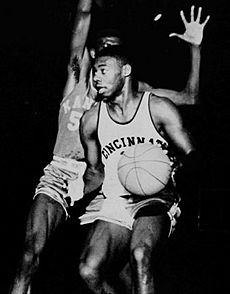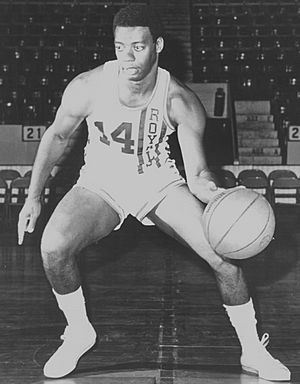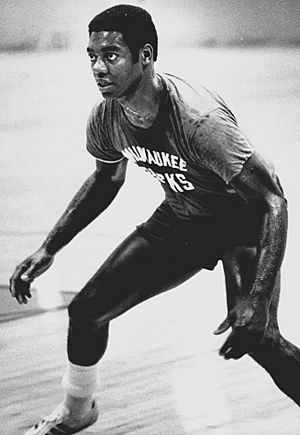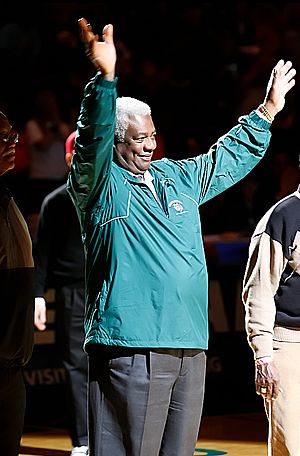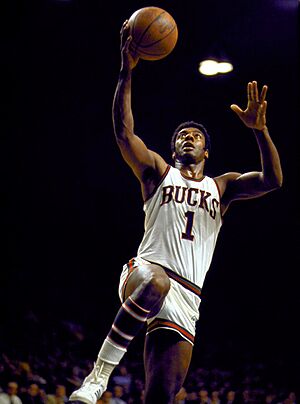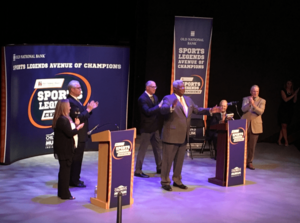Oscar Robertson facts for kids
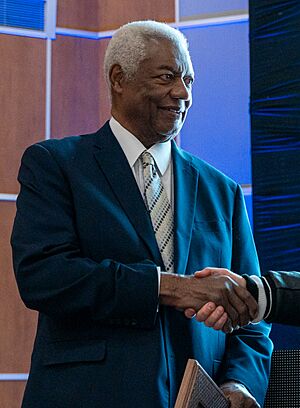
Robertson in 2024
|
||||||||||||||||||||
| Personal information | ||||||||||||||||||||
|---|---|---|---|---|---|---|---|---|---|---|---|---|---|---|---|---|---|---|---|---|
| Born | November 24, 1938 Charlotte, Tennessee, U.S. |
|||||||||||||||||||
| High school | Crispus Attucks (Indianapolis, Indiana) | |||||||||||||||||||
| Listed height | 6 ft 5 in (1.96 m) | |||||||||||||||||||
| Listed weight | 205 lb (93 kg) | |||||||||||||||||||
| Career information | ||||||||||||||||||||
| College | Cincinnati (1957–1960) | |||||||||||||||||||
| NBA Draft | 1960 / Pick: territorial pick | |||||||||||||||||||
| Selected by the Cincinnati Royals | ||||||||||||||||||||
| Pro career | 1960–1974 | |||||||||||||||||||
| Career history | ||||||||||||||||||||
| 1960–1970 | Cincinnati Royals | |||||||||||||||||||
| 1970–1974 | Milwaukee Bucks | |||||||||||||||||||
| Career highlights and awards | ||||||||||||||||||||
|
||||||||||||||||||||
| Career NBA statistics | ||||||||||||||||||||
| Points | 26,710 (25.7 ppg) | |||||||||||||||||||
| Rebounds | 7,804 (7.5 rpg) | |||||||||||||||||||
| Assists | 9,887 (9.5 apg) | |||||||||||||||||||
|
Medals
|
||||||||||||||||||||
Oscar Palmer Robertson (born November 24, 1938), known as "the Big O", is a famous American former professional basketball player. He played for the Cincinnati Royals and Milwaukee Bucks in the National Basketball Association (NBA). Many people think Robertson is one of the greatest point guards ever. He was an All-Star 12 times and won the MVP award in 1964.
In the 1962 season, he made history. He was the first player in the NBA to average a triple-double for a whole season. This means he averaged double digits in points, rebounds, and assists. Only two other players, Russell Westbrook and Nikola Jokić, have done this since. In the 1970–71 NBA season, he helped the Bucks win their first NBA championship.
Robertson faced challenges like racism during his high school and college years. He is in the Naismith Memorial Basketball Hall of Fame twice. Once for his amazing career (1980) and again as part of the 1960 United States men's Olympic basketball team (2010). He also led the National Basketball Players Association.
Robertson was also important in a big court case in 1970. This case changed the rules for players in the NBA. It made it easier for players to switch teams and helped them earn more money.
Contents
Early Life and Basketball Beginnings
Oscar Robertson was born in Charlotte, Tennessee, in 1938. His family moved to Indianapolis, Indiana, when he was very young. He grew up in a neighborhood where people of different races lived separately.
Oscar loved basketball. He learned to shoot by tossing tennis balls into a peach basket. Basketball was a game he could play even without fancy equipment.
High School Success
Robertson went to Crispus Attucks High School, which was an all-black school. His coach, Ray Crowe, taught him strong basketball skills. In 1955, his team won the state championship. This was the first time an all-black school in the nation won a state title. It was also the first state championship for an Indianapolis team.
In his final year, 1956, Robertson scored 24 points per game. His team had a perfect 31–0 record and won another state championship. They set a state record with 45 straight wins. After winning, the team had a parade. But unlike other teams, they were taken to a park outside downtown for their celebration. Robertson said officials worried about how people would react to a black team winning.
College Basketball Career
Robertson continued to shine at the University of Cincinnati. He averaged 33.8 points per game, one of the highest in college history. For all three of his college years, he won the national scoring title. He was also named the best college player each year.
His great play helped the Bearcats win many games. They reached the Final Four twice. But a championship win in college was something he didn't achieve. When he left college, he was the all-time leading scorer in NCAA history. The Oscar Robertson Trophy is now given to the best college player each year, named in his honor.
Even with his success, Robertson faced racism in college. Traveling to some cities was hard because of segregation. He often had to sleep in college dorms instead of hotels.
Olympic Gold Medalist
After college, Robertson was a co-captain for the 1960 United States men's Olympic basketball team. This team played in the 1960 Summer Olympics. Many people called it the best basketball team ever assembled at that time.
The U.S. team easily won the gold medal. They won their nine games by a huge average of 42.4 points. Robertson was the team's top scorer. Many players from this team later played in the NBA, including future Hall of Famers like Jerry West and Jerry Lucas.
Professional Career Highlights
Cincinnati Royals Years (1960–1970)
In 1960, the Cincinnati Royals drafted Oscar Robertson. In his first NBA game, he had 21 points, 12 rebounds, and 10 assists. In his first season, he nearly averaged a triple-double. He averaged 30.5 points, 10.1 rebounds, and 9.7 assists. He was named NBA Rookie of the Year and made the All-NBA First Team. He also played in the All-Star Game for the first of 12 times.
In the 1961–62 season, Robertson made history. He became the first player to average a triple-double for an entire season. He had 30.8 points, 12.5 rebounds, and 11.4 assists per game. He also set a record with 41 triple-doubles in one season. This record stood for over 50 years.
In the 1963–64 season, Robertson had an amazing year. He led the NBA in free-throw percentage and scored a career-high 31.4 points per game. He also averaged 9.9 rebounds and 11.0 assists. He won the NBA MVP award that year. He also won his second All-Star Game MVP award.
Despite Robertson's incredible play, the Royals struggled as a team. They were often eliminated early in the playoffs or missed them entirely.
Milwaukee Bucks and an NBA Championship (1970–1974)
Before the 1970–71 season, the Royals traded Robertson to the Milwaukee Bucks. This trade was great for Robertson. He joined a young star named Kareem Abdul-Jabbar (then known as Lew Alcindor).
With Robertson and Abdul-Jabbar, the Bucks became a powerhouse. They had the best record in the league (66–16). They also won 20 games in a row. In the 1971 NBA playoffs, they dominated. They swept the Baltimore Bullets 4–0 in the 1971 NBA Finals. For the first time in his career, Robertson had won an NBA championship!
Robertson played three more seasons with the Bucks. They continued to be a strong team. In his last season, 1974, he helped the Bucks reach the 1974 NBA Finals again. They lost in seven games to the Boston Celtics. After he retired, the Bucks struggled without him, even with Abdul-Jabbar still on the team.
Off the Court and Legacy
After retiring from playing, Robertson worked to improve life in his hometown of Indianapolis. He especially focused on helping African-American communities. He also worked as a TV commentator for basketball games.
Both the Sacramento Kings (formerly the Cincinnati Royals) and the Milwaukee Bucks have retired his jersey numbers. A nine-foot bronze statue of Robertson stands at the University of Cincinnati. He often attends games there.
In 2006, Robertson was part of the first group inducted into the National Collegiate Basketball Hall of Fame. He was honored alongside legends like John Wooden and Bill Russell. In 2018, he received the NBA Lifetime Achievement Award. In 2021, he was named to the NBA 75th Anniversary Team, honoring the league's greatest players.
Oscar Robertson's Impact on Basketball
Oscar Robertson is known as one of the greatest players in NBA history. He was a "triple threat" because he could score, rebound, and pass incredibly well. He averaged over 30 points per game in six of his first seven seasons. He was also the first player to average more than 10 assists per game.
Robertson is also the first guard in NBA history to average more than 10 rebounds per game. He did this three times. For his career, he had 181 triple-doubles. This was a record for many decades. These numbers are even more impressive because the three-point shot didn't exist when he played.
Standing 6 feet 5 inches tall, Robertson was seen as the first "big guard." He opened the way for other tall guards like Magic Johnson. He is also credited with inventing the "head fake" and the "fadeaway jump shot." These moves were later made famous by players like Michael Jordan.
In 1980, Oscar Robertson was inducted into the Naismith Memorial Basketball Hall of Fame. He was also named to the NBA's 35th, 50th, and 75th Anniversary Teams. In 2006, ESPN called him the second-greatest point guard of all time.
The award for the best college basketball player each year is now called the Oscar Robertson Trophy. This honors his amazing college career and his continued support for basketball. In 2022, the NBA renamed its Western Conference championship trophy after him.
NBA Career Statistics
| Legend | |||||
|---|---|---|---|---|---|
| GP | Games played | GS | Games started | MPG | Minutes per game |
| FG% | Field goal percentage | 3P% | 3-point field goal percentage | FT% | Free throw percentage |
| RPG | Rebounds per game | APG | Assists per game | SPG | Steals per game |
| BPG | Blocks per game | PPG | Points per game | Bold | Career high |
Regular season
| Year | Team | GP | GS | MPG | FG% | FT% | RPG | APG | SPG | BPG | PPG |
|---|---|---|---|---|---|---|---|---|---|---|---|
| 1960–61 | Cincinnati | 71 | 42.7 | .473 | .822 | 10.1 | 9.7* | 30.5 | |||
| 1961–62 | Cincinnati | 79 | 44.3 | .478 | .803 | 12.5 | 11.4* | 30.8 | |||
| 1962–63 | Cincinnati | 80* | 44.0 | .518 | .810 | 10.4 | 9.5 | 28.3 | |||
| 1963–64 | Cincinnati | 79 | 45.1 | .483 | .853* | 9.9 | 11.0* | 31.4 | |||
| 1964–65 | Cincinnati | 75 | 45.6* | .480 | .839 | 9.0 | 11.5* | 30.4 | |||
| 1965–66 | Cincinnati | 76 | 46.0 | .475 | .842 | 7.7 | 11.1* | 31.3 | |||
| 1966–67 | Cincinnati | 79 | 43.9 | .493 | .873 | 6.2 | 10.7 | 30.5 | |||
| 1967–68 | Cincinnati | 65 | 42.5 | .500 | .873* | 6.0 | 9.7* | 29.2* | |||
| 1968–69 | Cincinnati | 79 | 43.8 | .486 | .838 | 6.4 | 9.8* | 24.7 | |||
| 1969–70 | Cincinnati | 69 | 41.5 | .511 | .809 | 6.1 | 8.1 | 25.3 | |||
| 1970–71† | Milwaukee | 81 | 39.4 | .496 | .850 | 5.7 | 8.2 | 19.4 | |||
| 1971–72 | Milwaukee | 64 | 37.3 | .472 | .836 | 5.0 | 7.7 | 17.4 | |||
| 1972–73 | Milwaukee | 73 | 37.5 | .454 | .847 | 4.9 | 7.5 | 15.5 | |||
| 1973–74 | Milwaukee | 70 | 35.4 | .438 | .835 | 4.0 | 6.4 | 1.1 | .1 | 12.7 | |
| Career | 1,040 | 42.2 | .485 | .838 | 7.5 | 9.5 | 1.1 | .1 | 25.7 | ||
| All-Star | 12 | 10 | 31.7 | .512 | .714 | 5.8 | 6.8 | 20.5 | |||
Playoffs
| Year | Team | GP | MPG | FG% | FT% | RPG | APG | SPG | BPG | PPG |
|---|---|---|---|---|---|---|---|---|---|---|
| 1962 | Cincinnati | 4 | 46.3 | .519 | .795 | 11.0 | 11.0 | 28.8 | ||
| 1963 | Cincinnati | 12 | 47.5 | .470 | .864 | 13.0 | 9.0 | 31.8 | ||
| 1964 | Cincinnati | 10 | 47.1 | .455 | .858 | 8.9 | 8.4 | 29.3 | ||
| 1965 | Cincinnati | 4 | 48.8 | .427 | .923 | 4.8 | 12.0 | 28.0 | ||
| 1966 | Cincinnati | 5 | 44.8 | .408 | .897 | 7.6 | 7.8 | 31.8 | ||
| 1967 | Cincinnati | 4 | 45.8 | .516 | .892 | 4.0 | 11.3 | 24.8 | ||
| 1971† | Milwaukee | 14 | 37.1 | .486 | .754 | 5.0 | 8.9 | 18.3 | ||
| 1972 | Milwaukee | 11 | 34.5 | .407 | .833 | 5.8 | 7.5 | 13.1 | ||
| 1973 | Milwaukee | 6 | 42.7 | .500 | .912 | 4.7 | 7.5 | 21.2 | ||
| 1974 | Milwaukee | 16 | 43.1 | .450 | .846 | 3.4 | 9.3 | .9 | .3 | 14.0 |
| Career | 86 | 42.7 | .460 | .855 | 6.7 | 8.9 | .9 | .3 | 22.2 | |
Personal Life
Oscar Robertson is the son of Mazell and Bailey Robertson. He has two brothers, Bailey Jr. and Henry. He remembers growing up in a tough time, dealing with poverty and racism.
In 1997, Robertson donated one of his kidneys to his daughter, Tia. She had lupus, which caused her kidneys to fail. He has been a spokesperson for the National Kidney Foundation ever since. In 2003, he wrote a book about his life called The Big O: My Life, My Times, My Game. Robertson also owns a chemical company in Cincinnati, Ohio.
He still loves basketball and watches games on TV. He also goes to most home games for the University of Cincinnati. His main hobby is woodworking.
See also
 In Spanish: Oscar Robertson para niños
In Spanish: Oscar Robertson para niños
- List of NBA career scoring leaders
- List of NBA career assists leaders
- List of NBA career free throw scoring leaders
- List of NBA career triple-double leaders
- List of NBA longest winning streaks
- List of NBA rookie single-season scoring leaders
 | Laphonza Butler |
 | Daisy Bates |
 | Elizabeth Piper Ensley |


